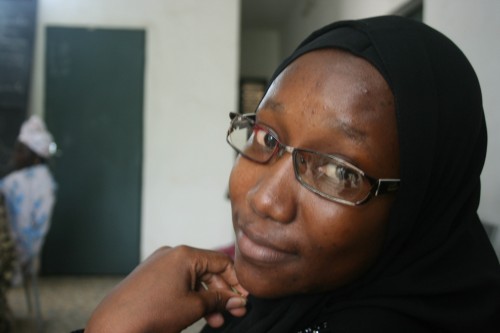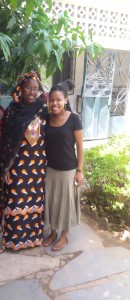
The person I have been working closest with at Sini Sanuman has been the program assistant, Awa Sangaré. Awa, 34, was brought on as an English-speaking assistant to help the organization communicate in both English and French. We produce reports, newsletters, and other documents in both languages together.
Prior to joining Sini Sanuman last year, she spent 8 years in Nigeria with her family where her husband was in the diplomatic service as the second councilor to the Malian ambassador to Nigeria. While there, she learnt English, which most Malians do not speak.
Awa first heard about Sini Sanuman from her mother, a court clerk at the court of justice in Bamako’s 6th commune. Her mother had met Mariam Seck, the outreach coordinator and head of Sini Sanuman’s community organizers and thought that Awa may be interested in working with them because of their work with women and children.
An educator by training, Awa has always loved children and spent some time working with vulnerable children while she was still an MSc Education student at the University of Bamako, where she also received her Bachelor’s degree in Education. She worked primarily with children aged 0-3 who were either orphans, abandoned, or had mothers with mental illnesses at an infant care home (Poupponière de Bamako), keeping track of their health and nutrition.
Upon returning from Nigeria, Awa spent nine months interning with Sini Sanuman before settling into her post as program assistant. She primarily did community outreach with Mariam Seck, the outreach coordinator. She was able to learn about excision, GBV, communication, and awareness raising or public education techniques.
She feels very fortunate to be doing work she cares deeply about in a country where youth unemployment is a real problem and opportunities are scarce even for highly educated young people.
Awa believes in Sini Sanuman’s work because they are helping poor people and educating the population, especially women, about topics that are often taboo. She sees excision as a bad practice because it of its many negative consequences, such as trouble urinating, hemorrhaging, and other pregnancy complications that can lead to death. Although the practice continues, she says that some people are beginning to change their beliefs.
She thinks gender-based violence, which includes rape, sexual aggression, physical aggression, denial of resources, forced marriage, and emotional abuse is physically, medically, and psychologically damaging. Women do not know their rights and therefore do not report their cases, which would eventually decrease GBV. They blame themselves or believe it is completely normal.
For these reasons, she believes in the importance and power of raising awareness of these issues. In particular, she thinks the best way to reach women is through community outreach – meeting with groups, giving them information, and allowing them to ask questions. While radio, television, and billboards are effective, community outreach is more affordable and interactive; people are able to ask questions and have a discussion.
Posted By Refilwe Moahi
Posted Jul 13th, 2015


